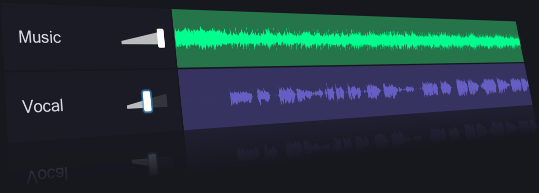Auphonic Key Features
- Audio Leveling: Auphonic’s leveling feature automatically adjusts the loudness of different parts of the audio to ensure consistent volume throughout the track. This is particularly useful for podcasts or interviews where speakers may have varying vocal levels. Auphonic applies industry-standard loudness normalization (LUFS) to ensure that audio meets broadcast standards.
- Noise and Hum Reduction: One of Auphonic’s key strengths is its AI-driven noise and hum reduction capabilities. The platform automatically detects and reduces unwanted background noise and hum, making it perfect for users recording in non-studio environments. For example, podcasters can remove ambient noise from home recordings, enhancing the overall clarity.
- Multitrack Processing: Auphonic allows users to upload multiple audio tracks and process them simultaneously. The platform automatically balances the audio between tracks, reducing the need for manual mixing. This feature is especially helpful for podcasters and musicians who need to combine vocals, music, and effects in one cohesive mix.
- Adaptive Leveler: The adaptive leveler automatically adjusts dynamic ranges, ensuring that both soft and loud sections of the audio are clearly audible. This feature is particularly beneficial for users who work with varying audio intensities, such as interviews with quiet and loud speakers.
- Loudness Normalization: Auphonic supports loudness normalization to ensure that your audio meets the standards required for broadcast and streaming platforms. By applying LUFS-based normalization, the tool helps users create audio that is balanced and consistent across different playback devices and environments.
- Speech Recognition and Transcription: Auphonic offers built-in speech recognition and transcription services. This feature automatically generates transcripts from audio recordings, making it ideal for podcasters or journalists who need written versions of interviews or discussions.
- Cross-Platform Integration: Auphonic integrates with popular platforms like YouTube, SoundCloud, Dropbox, and Google Drive, allowing users to upload or download audio directly to and from these platforms. This integration streamlines workflows by reducing the need for manual uploads and downloads.
- Custom Metadata and Chapter Marking: For podcast creators, Auphonic allows users to add custom metadata and chapters to their audio files. This feature is useful for organizing and structuring longer podcast episodes, making it easier for listeners to navigate.
Our Opinion Of Auphonic
Auphonic is an excellent tool for podcasters, content creators, and video producers who need automated audio post-production without the hassle of mastering audio engineering. Its AI-powered features, like noise reduction, leveling, and loudness normalization, ensure that users can produce professional-quality audio effortlessly. While it may not offer the detailed customization that advanced audio engineers or music producers require, it is perfect for users looking for a fast and reliable solution to improve their audio quality.
Who Should Use Auphonic:
- Podcasters: Auphonic is ideal for podcasters who want to improve their audio quality without needing in-depth technical knowledge.
- Content Creators: Great for YouTubers, vloggers, and online course creators who need consistent audio output for videos.
- Journalists and Interviewers: The speech recognition and transcription features make it easy to turn recorded interviews into written content.
- Beginners and Non-Technical Users: Perfect for those who want professional-quality audio without having to deal with complex settings.
Overall, Auphonic offers significant value for creators who need quick, high-quality audio processing at an affordable price.















